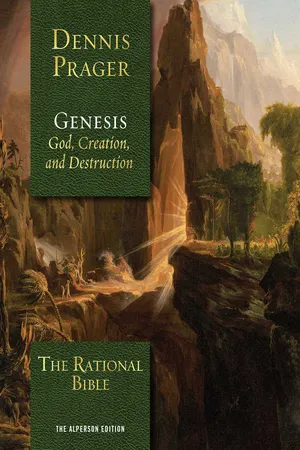
- 520 pages
- English
- ePUB (mobile friendly)
- Available on iOS & Android
The Rational Bible: Genesis
About this book
USA Today bestseller Publishers Weekly bestseller Wall Street Journal bestseller Many people today think the Bible, the most influential book in world history, is not only outdated but irrelevant, irrational, and even immoral. This explanation of the Book of Genesis, the first book of the Bible, demonstrates clearly and powerfully that the opposite is true. The Bible remains profoundly relevant—both to the great issues of our day and to each individual life. It is the greatest moral guide and source of wisdom ever written. Do you doubt the existence of God because you think believing in God is irrational? This book will give you many reasons to rethink your doubts. Do you think faith and science are in conflict? You won't after reading this commentary on Genesis. Do you come from a dysfunctional family? It may comfort you to know that every family discussed in Genesis was highly dysfunctional! The title of this commentary is "The Rational Bible" because its approach is entirely reason-based. The reader is never asked to accept anything on faith alone. In Dennis Prager's words, "If something I write is not rational, I have not done my job." The Rational Bible is the fruit of Dennis Prager's forty years of teaching the Bible—whose Hebrew grammar and vocabulary he has mastered—to people of every faith and no faith at all. On virtually every page, you will discover how the text relates to the contemporary world in general and to you personally. His goal: to change your mind—and, as a result, to change your life.
Information
Table of contents
- Cover
- Dedication
- Introduction
- Preface
- Chapter 1
- Chapter 2
- Chapter 3
- Chapter 4
- Chapter 5
- Chapter 6
- Chapter 7
- Chapter 8
- Chapter 9
- Chapter 10
- Chapter 11
- Chapter 12
- Chapter 13
- Chapter 14
- Chapter 15
- Chapter 16
- Chapter 17
- Chapter 18
- Chapter 19
- Chapter 20
- Chapter 21
- Chapter 22
- Chapter 23
- Chapter 24
- Chapter 25
- Chapter 26
- Chapter 27
- Chapter 28
- Chapter 29
- Chapter 30
- Chapter 31
- Chapter 32
- Chapter 33
- Chapter 34
- Chapter 35
- Chapter 36
- Chapter 37
- Chapter 38
- Chapter 39
- Chapter 40
- Chapter 41
- Chapter 42
- Chapter 43
- Chapter 44
- Chapter 45
- Chapter 46
- Chapter 47
- Chapter 48
- Chapter 49
- Chapter 50
- About the Author
- Notes
- Copyright
Frequently asked questions
- Essential is ideal for learners and professionals who enjoy exploring a wide range of subjects. Access the Essential Library with 800,000+ trusted titles and best-sellers across business, personal growth, and the humanities. Includes unlimited reading time and Standard Read Aloud voice.
- Complete: Perfect for advanced learners and researchers needing full, unrestricted access. Unlock 1.4M+ books across hundreds of subjects, including academic and specialized titles. The Complete Plan also includes advanced features like Premium Read Aloud and Research Assistant.
Please note we cannot support devices running on iOS 13 and Android 7 or earlier. Learn more about using the app